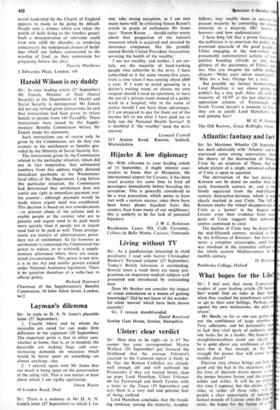Layman's dilemma
Sir: In reply to D. A. N. Jones's plausible letter (27 September): 1. Exactly where and by whom the incurable are cared for can make little difference to my argument (20 September). The important point is that in either case, whether at home, that is, or in hospital, the incurable are making huge and ever- increasing demands on resources which would be better spent on something—on almost anything—else.
2. I entirely agree with Mr Jones that too much is being spent on the preservation of the ailing rich, This is one matter at least about which I am rigidly egalitarian. Simon Raven 40 London Road, Deal Sir: There is a sentence in Mr D. A. N. Jones's letter (27 September) to which I, for one, take strong exception, as I am sure many more will. In criticising Simon Raven's article in praise of euthanasia Mr Jones says: 'Simon Raven .. . should rather worry about that proportion of the nation's resources which is acquired and invested by insurance companies, like the grandly named British United Provident Association, servicing the health of the wealthy.'
I am not wealthy, and neither, I am cer- tain, are the majority of hard-working people who subscribe to the BUPA. I have subscribed to it for some twenty-five years, from a time when I was earning about f600 a year. If I want to avoid queueing in a doctor's waiting room, or choose my own surgeon should I need an operation, or have the use of a private room instead of a public ward in a hospital, why in the name of justice should I not have these advantages, if I am prepared to pay for them out of the income left to me after I have paid tax to help run the National Health Service? It is doubtful if 'the wealthy' need the BUPA anyway.
Leonard Cottrell 217 Station Road, Knowle, Solihull, Warwickshire


































 Previous page
Previous page